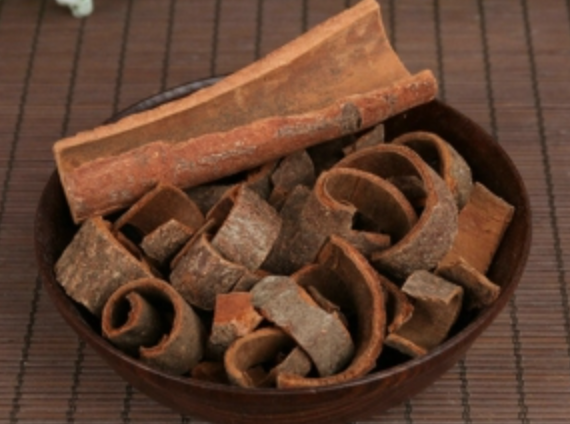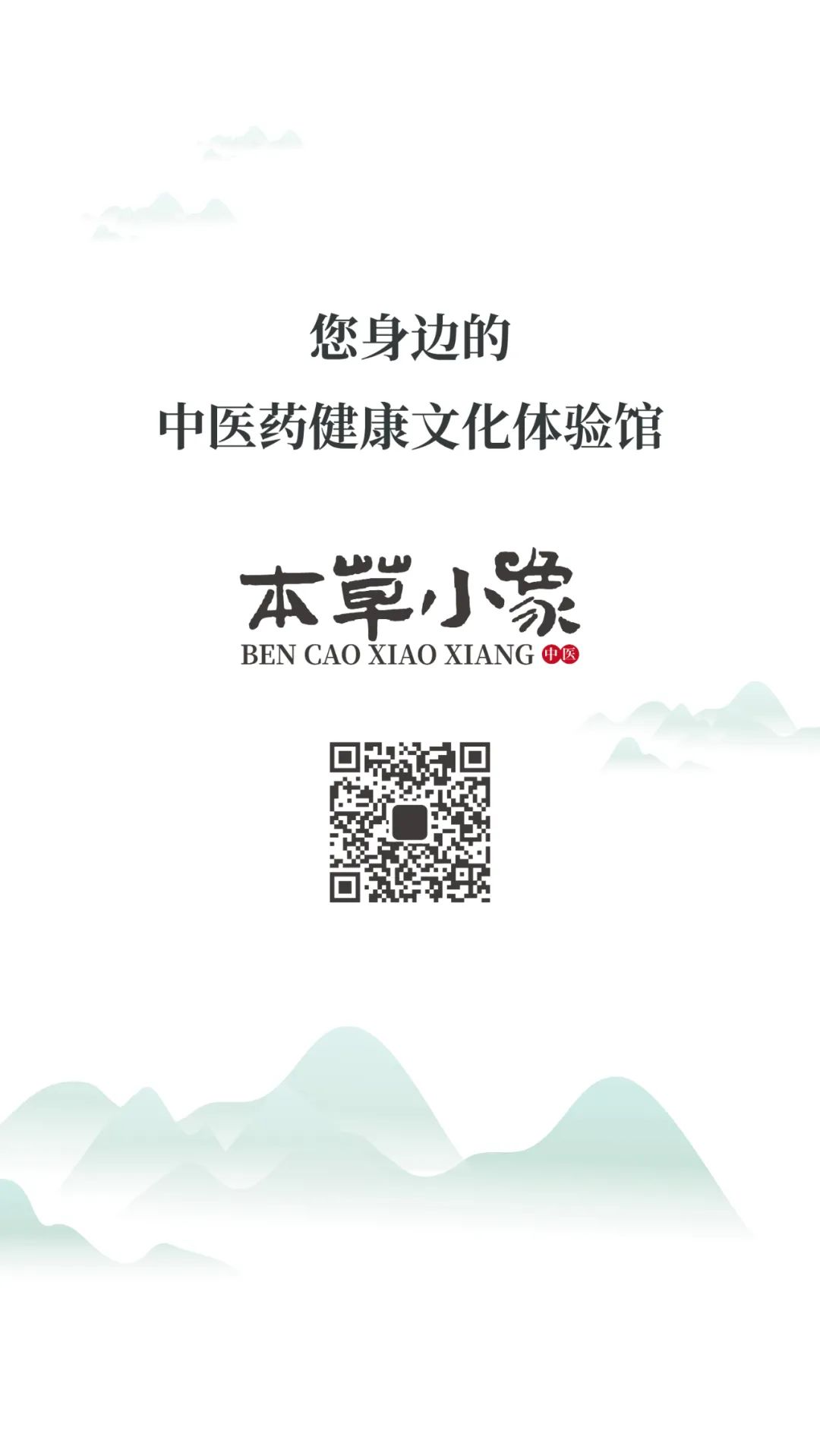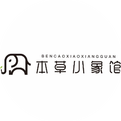
Cinnamon (Rou Gui), also known as Mu Gui, Zi Gui, and Da Gui, has a pungent and sweet flavor, and is characterized as very warm in nature. It enters the Kidney, Spleen, Heart, and Liver meridians. It is the dried bark of the Cinnamomum plant. Cinnamon is known for its ability to nourish fire and aid yang, dispel cold, alleviate pain, and invigorate blood circulation. It is used for conditions such as kidney yang deficiency, impotence, cold in the womb, dizziness, red eyes, cold abdominal pain, cold bi syndrome, cold hernia, blood stasis due to cold, dysmenorrhea, and yin sores.
01Functions
Nourishes fire and aids yang, dispels cold, alleviates pain, and invigorates blood circulation.
02Indications
1. Primarily used for kidney yang deficiency, impotence, cold in the womb, dizziness, red eyes, cold abdominal pain, cold bi syndrome, cold hernia, blood stasis due to cold, dysmenorrhea, and yin sores.
2. In Western medicine, it is indicated for chronic nephritis, diabetes, hyperaldosteronism, hypothyroidism, sexual neurasthenia, and adrenal cortex insufficiency associated with kidney yang deficiency, as well as coronary heart disease angina and thromboangiitis obliterans associated with blood stasis due to cold.
03Dosage and Administration
Internal use: decoction, 2-5 grams, not suitable for prolonged boiling; powdered form, 0.5-1.5 grams; or in pill form. External use: powdered form for topical application; soaked in alcohol for rubbing.
04Contraindications
1. Contraindications for herbal compatibility:
(1) Cinnamon should not be used with Shizhi (alum), as the aluminum silicate in alum can absorb the active components of cinnamon, reducing its efficacy.
(2) Should not be used with Fanxieye (senna leaves).
(3) Fuzi (Aconite) can enhance the side effects of cinnamon, such as headache and dizziness; caution is advised when used together.
2. Contraindications for compatibility with Western medicine:
(1) When used with sedatives, anesthetics, or antihypertensives, the dosage should not be excessive.
(2) Propranolol can inhibit the positive inotropic and chronotropic effects of cinnamon; they should not be used together.
(3) Phenoxybenzamine can antagonize the pressor effect of cinnamon; they should not be used together.
(4) When used with aspirin, the sweating effect is enhanced, increasing the risk of toxic reactions; they should not be used together.
(5) It can inhibit the activity of pancreatic enzymes, reducing their ability to digest proteins; therefore, they should not be used together.
05Precautions
Cinnamon can aid yang and invigorate blood; it should be avoided in cases of yin deficiency with a tendency to bleed. Pregnant women should use it with caution.
06Clinical Applications
1. Taiping Huimin Heji Ju Fang – Shi Quan Da Bu Tang: Tonifies qi and blood, nourishes the heart, and calms the spirit. Indicated for labor accumulation, deficiency, shortness of breath, palpitations, dry throat, and chapped lips.
2. Taiping Huimin Heji Ju Fang – Ren Shen Yang Ying Tang: Warms and tonifies qi and blood, indicated for qi and blood deficiency, consumptive cough, reduced appetite, nocturnal emissions, weakness in the legs and knees, non-healing sores, and women’s metrorrhagia.
3. Taiping Huimin Heji Ju Fang – Wu Ji San: Regulates qi and transforms phlegm, invigorates blood and resolves accumulation, indicated for exterior wind-cold, internal injury from cold, fever without sweating, headache, body aches, stiff neck and back, fullness in the chest with aversion to food, vomiting, abdominal pain, and women’s blood qi disharmony, abdominal pain, and irregular menstruation due to cold.
4. Suwen Bing Ji Qi Yi Bao Ming Ji – Shao Yao Tang: Harmonizes qi and blood, clears heat and detoxifies, indicated for damp-heat dysentery.
5. Taiping Huimin Heji Ju Fang – Su Zi Jiang Qi Tang: Descends qi and relieves asthma, expels phlegm and stops cough, indicated for excess above and deficiency below, cough with phlegm obstruction.
07Related Combinations
1. Cinnamon combined with Huang Qi: Cinnamon is good at nourishing fire and aiding yang; Huang Qi excels at tonifying qi. Together, they warm yang and tonify qi, suitable for qi deficiency, yang deficiency, and conditions of qi and blood deficiency, as well as yin sores.
2. Cinnamon combined with Shu Di Huang: Cinnamon nourishes fire and aids yang; Shu Di Huang nourishes yin and blood. Together, they nourish yin and assist yang, and warm and tonify the liver and kidneys, suitable for kidney yang deficiency, declining fire at the life gate, impotence, and cold pain in the lower back and knees.
3. Cinnamon combined with Gan Jiang: Cinnamon excels at nourishing fire and aiding yang; Gan Jiang is good at warming the middle and dispelling cold. Together, they enhance the ability to dispel cold and alleviate pain, suitable for chronic cold accumulation and abdominal pain.
4. Cinnamon combined with Fu Zi: Cinnamon is mild and can guide fire back to the source; Fu Zi is potent and can revive yang and rescue from collapse. Together, they warm the kidneys and assist yang, guiding fire back to the source, suitable for declining fire at the life gate, kidney yang deficiency, lower back and knee weakness, cold limbs, impotence, and frequent urination.
5. Cinnamon combined with Du Huo: Cinnamon excels at warming and tonifying the liver and kidneys, nourishing fire and aiding yang; Du Huo is good at dispelling wind-dampness and tonifying the liver and kidneys. Together, they enhance the ability to dispel wind and dampness and warm and tonify the liver and kidneys, suitable for wind-cold-damp bi syndrome and pain in the lower back and legs.
6. Cinnamon combined with Wu Zhu Yu: Cinnamon nourishes fire and aids yang, dispels cold and alleviates pain; Wu Zhu Yu soothes the liver and descends qi, dispelling cold and alleviating pain. Together, they enhance the ability to warm the liver, dispel cold, and alleviate pain, suitable for cold hernia and abdominal pain.
7. Cinnamon combined with Bai Zhu: Cinnamon is effective at tonifying the kidneys and assisting yang; Bai Zhu is effective at strengthening the spleen and drying dampness. Together, they achieve the effect of tonifying the kidneys and strengthening the spleen, suitable for spleen and kidney yang deficiency and vomiting and abdominal pain.
8. Cinnamon combined with Dang Gui: Cinnamon excels at warming yang, dispelling cold, and alleviating pain; Dang Gui excels at nourishing blood and promoting circulation. Together, they enhance the ability to warm yang, dispel cold, invigorate blood, regulate menstruation, and alleviate pain, suitable for cold stagnation in the Chong and Ren channels, dysmenorrhea, and menstrual pain.
9. Cinnamon combined with Mo Yao: Cinnamon excels at warming yang, dispelling cold, invigorating blood, and regulating menstruation; Mo Yao excels at invigorating blood and resolving stasis, alleviating pain. Together, they enhance the ability to invigorate blood, regulate menstruation, and alleviate pain, suitable for blood stasis in the lower abdomen, dysmenorrhea, and abdominal masses.
10. Cinnamon combined with Sang Ji Sheng: Cinnamon excels at dispelling cold and alleviating pain; Sang Ji Sheng excels at dispelling wind and dampness. Together, they enhance the ability to dispel wind and dampness and alleviate pain, suitable for cold bi syndrome and lower back pain.
Dietary Therapy: Cinnamon Porridge
Ingredients: 1-2 grams of cinnamon powder, 100 grams of japonica rice, appropriate amount of sugar.
Method: Wash the japonica rice, add sugar, and cook into porridge. When cooked, add cinnamon powder and simmer on low heat until thickened, then stop cooking.
Usage: Take warm on an empty stomach before bed each night.
Effects: Warms the middle and tonifies yang. Suitable for cold womb infertility and cold dysmenorrhea.
(Please use the formulas mentioned in this article under the guidance of a physician)

Source:China Medical Information Query Platform

